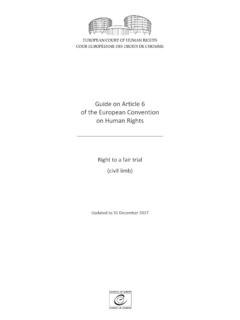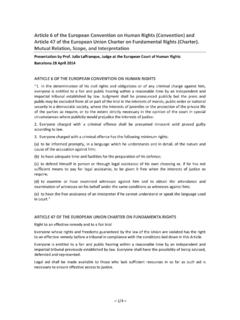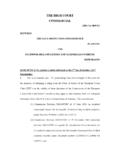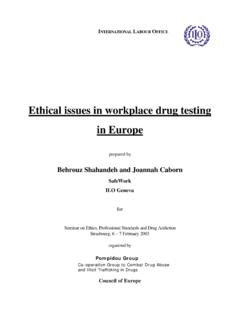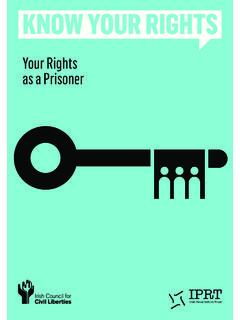Transcription of The Foundation for Courts and the Making of Public Policy ...
1 The Foundation for Law, Justice and Society in affiliation withThe Centre for Socio-Legal Studies, University of and the Making of Public PolicyThe Role of Courts in aDemocracyREPORT AND ANALYSIS OF A WORKSHOP AND Public DEBATEHELD AT MAGDALEN COLLEGE, OXFORD10 11 February 2011 Cristina ParauThe Foundation forLaw, Justice and SocietyBridging the gap between academia and policymakersROCD Report [4]:Layout 1 2/6/11 09:33 Page 3 The Foundation forLaw, Justice and Society The Foundation for Law, Justice and Society 2011 ROCD Report [4]:Layout 1 2/6/11 09:33 Page 4 CONTENTS.
2 1 ContentsIntroduction2 Judicial Supremacy? 3 Political Constitutionalism and the human Rights Act 6 Judicial Reform in Post-Communist Eastern europe : Falling in Step with the West? 9 Access to Justice and the Paradox of Legal Mobilization by the Environmental Movement in the UK 11 The Rise of Eurolegalism and its Implications for Democracy in europe 13 International Courts and Democracy 16 Courts : Threat or Resource for Democracy? 19 Public Debate: The Role of Courts in a Democracy22 ROCD Report [4]:Layout 1 2/6/11 09:33 Page ROLE OF Courts IN A DEMOCRACYThis academic workshop, held at Magdalen College aspart of the Foundation for Law, Justice and Society sprogramme on Courts and the Making of Public Policy ,examined a wide range of empirical, theoretical, andnormative questions, while re-visiting long-standingcontroversies in light of new evidence about the roleof Courts in a democracy.
3 Questions examined in thisworkshop included: What ought to be the role of Courts in ademocratic society? Ought judges intervene in Policy processes orcontroversies between the branches ofgovernment, or should they confine themselves todeciding the guilt or innocence of individualpersons? Does judicial activism promote or underminedemocracy? Do Courts serve as important participatory venuesfor citizens and groups to engage in thedevelopment and enforcement of law? Is the supremacy of the judiciary branch inconstitutional matters, or in cases of dispute withthe elected branches, incompatible with thedemocratic ideal of popular sovereignty?
4 If judicial activism were to become excessive, howand by whom ought it be curtailed? Do alternatives to the judicialization of politicsexist that are more compatible with democracy yetdo not compromise the rule of law? Is the nature of judicial supremacy fundamentallydifferent in post-communist East europe comparedwith the West?Featuring theoretical, historical, and comparativepapers, this workshop addressed these questions bybringing together political scientists, legal scholars,and political theorists. IntroductionROCD Report [4]:Layout 1 2/6/11 09:33 Page 2 JUDICIAL SUPREMACY?
5 3 Professor Eivind Smith, University ofOslo Professor Smith opened the workshop with apresentation that questioned the exact meaning andreality of key terms that frequently feature indebates about the role of Courts in a democracy: constitutionalism , democracy , judicial activism , the judicialization of politics , and judicialsupremacy . He argued that these value-loadedconcepts have become trump words , strategicallydeployed by actors in ideologically opposed camps inthe political controversies surrounding the role ofcourts in a democratic polity.
6 He then presented thetwo competitive models of the judiciary-electedbranch relationship. Professor Smith rejected the idea that the Americanmodel of judicial supremacy would be adequate forEurope. He doubted its relevance to Making sense ofrecent developments in judiciary-elected branchpower relations in the UK, or in europe moregenerally. Presenting two radically differentperspectives on the role of Courts in a democracy, heplaced particular emphasis on one issue that hasbeen especially hotly debated by philosophers,political scientists, and legal scholars: what is thesubstance of constitutional rights and who ought tovindicate these rights judges or democraticallyelected politicians?
7 Professor Smith reminded theaudience that these two different perspectives havebecome known, in landmark works such as that ofProfessor Richard Bellamy, as legal constitutionalism and political constitutionalism in favour of the virtues of politicalconstitutionalism, Bellamy had faulted legalconstitutionalism (also known as judicial supremacy)for Making the untenable normative and empiricalassumption that judges are morally superior to, andindependent of politics (Bellamy 2007:2-3). Such apuzzling assumption derived from an idealization ofUS constitutional arrangements and the role of theSupreme Court by scholars such as Rawls andDworkin (Bellamy 2007:10).
8 Professor Smith proceeded to comment that therealms of law and politics are not easily exactly does the legal end and the political begin? Do constitutional court judges interpretingabstract language and vague statements of principlein a constitution really confine themselves to purelylegal reasoning? Or do they in fact make politicalchoices between competing values and norms,choices that might be better left to democraticdeliberation? A classical example of judicialoverstepping into the realm of politics is the USSupreme Court decision in Roe v.
9 Wade(1973) onabortion. Based upon a peculiar reading of a right toprivacy not in fact mentioned in the US Constitution,the Court majority made a political choice on a highlycontroversial issue that divides not only scholars andlawyers, but more importantly, the putativelysovereign people. Professor Smith concluded that onthis occasion the US Supreme Court stole a matterof legitimate political concern from the States of theUnion . If this is the judicial paradigm that isbecoming the norm in the UK or europe , ProfessorSmith argued, then it ought to be rejected, not leastfor the fact that judges are not morally superior , this paradigm is not the only one to derivefrom the US system.
10 An alternative perspective isembodied in the self-restrained behaviour of judgeslike Justice Scalia, who famously argued that it is notfor a committee of nine lawyers to change theconstitution (Scalia 1997), and that judges ought tobe guided by the original intent of thedemocratically delegated framers of the constitutionJudicial Supremacy? ROCD Report [4]:Layout 1 2/6/11 09:33 Page 3as it stood when ratified, or as amended according tothe formal procedures therein. Of course, originalintent has its own problems, particularly whether anyoriginal intent is discoverable for every conceivableconstitutional question that demands interpretativeresolution.
